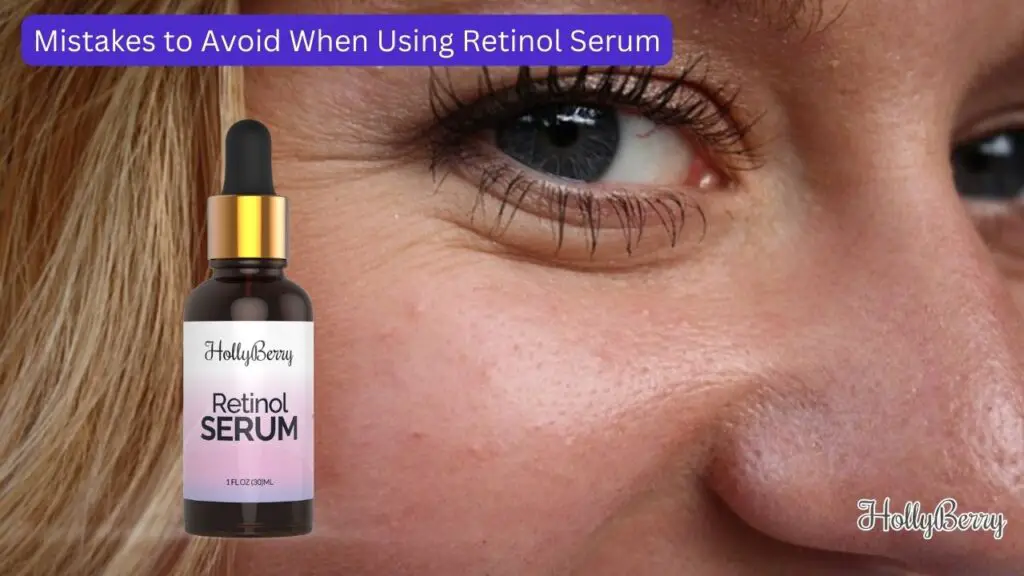
Retinol is a powerful ingredient that can work wonders for your skin. It is a form of vitamin A that is often used in skincare products to treat acne, reduce wrinkles, and improve overall skin texture.
Retinol serums are popular because they are easy to use and provide quick results. However, if not used correctly, retinol serums can cause adverse effects on the skin.
In this article, we will discuss the common mistakes to avoid when using retinol serum.
Understanding Retinol Serum
Retinol is a potent antioxidant that helps to stimulate collagen production and exfoliate dead skin cells. This makes it an excellent choice for anyone looking to reduce the appearance of fine lines, wrinkles, and hyperpigmentation.
Retinol serum is a concentrated form of retinol that is easily absorbed by the skin. It is a popular anti-ageing ingredient that can help improve skin texture, reduce acne, and promote an overall youthful appearance.
Mistake #1 – Starting with a High Concentration
Retinol is a potent ingredient, and it is essential to start with a low concentration and gradually work your way up. Using a high concentration of retinol serum can cause redness, peeling, and flaking of the skin. This can lead to a damaged skin barrier, making it more susceptible to environmental stressors.
Starting with a low concentration of retinol serum and gradually increasing it will help your skin adjust to the ingredient and minimize the risk of adverse effects.
Mistake #2 – Using Retinol During the Day
Retinol is a photosensitive ingredient, which means it breaks down in the presence of sunlight. Using retinol serum during the day can make your skin more susceptible to sun damage.
It is recommended to use retinol serum at night and follow up with broad-spectrum sunscreen during the day to protect your skin from the harmful effects of the sun.
Mistake #3 – Not Patch Testing
Before using a retinol serum, it is essential to patch test it first. Patch testing involves applying a small amount of the product on your skin and waiting for 24 hours to see if any adverse reactions occur.
This can help you identify if you have any sensitivity or allergies to the ingredient. Patch testing can save you from unwanted reactions, and it is crucial to do it before incorporating any new product into your skincare routine.
Mistake #4 – Overusing Retinol Serum
Retinol serum is a potent ingredient, and it is crucial not to overuse it. Overusing retinol serum can cause redness, dryness, and peeling of the skin.
It is recommended to start using retinol serum once or twice a week and gradually work your way up to daily use. This will help your skin adjust to the ingredient and minimize the risk of adverse effects.
Mistake #5 – Skipping Moisturizer
Using retinol serum can cause dryness and peeling of the skin. It is essential to use a moisturizer after applying retinol serum to keep your skin hydrated and prevent any adverse effects.
Moisturizers help to lock in moisture and keep your skin soft and supple. Skipping moisturizer can cause your skin to become dehydrated and irritated.
Mistake #6 – Using Retinol with Other Active Ingredients
Retinol serum is a potent ingredient, and it is essential not to mix it with other active ingredients such as AHAs, BHAs, and vitamin C. Using retinol serum with other active ingredients can cause irritation, redness, and dryness of the skin. It is recommended to use retinol serum on its own and wait for a few minutes before applying other skincare products.
Mistake #7 – Not Being Consistent
Using retinol serum requires consistency. It is not a quick fix, and it can take several weeks to see noticeable results. It is essential to use retinol serum regularly and be patient with the results.
Consistency is key when it comes to using any skincare product, and retinol serum is no exception.
Mistake #8 – Not Consulting with a Dermatologist
If you have sensitive skin or any skin condition, it is essential to consult with a dermatologist before using retinol serum. A dermatologist can help you determine if retinol serum is the right choice for your skin and recommend the best concentration and usage instructions.
Consulting with a dermatologist can help you avoid any adverse effects and ensure that you are using the product correctly.
Mistake #9 – Using Retinol During Pregnancy
Retinol is not recommended for use during pregnancy or while breastfeeding. It is a potent ingredient that can cause adverse effects on the developing fetus. It is recommended to avoid using any skincare products containing retinol during pregnancy and breastfeeding.
Mistake #10 – Not Following the Usage Instructions
Retinol serum comes with specific usage instructions, and it is essential to follow them carefully. Using too much or too little can cause adverse effects on the skin.
It is recommended to start with a low concentration and gradually work your way up while following the instructions carefully. This will help you avoid any adverse effects and ensure that you are using the product correctly.
FAQs: Retinol Serum
Q1: How long does it take to see results when using retinol serum?
A1: It can take several weeks to see noticeable results when using retinol serum. Consistency is key, and it is essential to use the product regularly to see the best results.
Q2: Can retinol serum cause adverse effects on the skin?
A2: Yes, using retinol serum incorrectly can cause adverse effects on the skin, such as redness, dryness, and peeling. It is essential to follow the usage instructions carefully and start with a low concentration to minimize the risk of adverse effects.
Q3: Can retinol serum be used during the day?
A3: It is not recommended to use retinol serum during the day as it is a photosensitive ingredient that can break down in the presence of sunlight. It is recommended to use retinol serum at night and follow up with broad-spectrum sunscreen during the day to protect your skin from the harmful effects of the sun.
Q4: Can retinol serum be used with other active ingredients?
A4: It is not recommended to use retinol serum with other active ingredients such as AHAs, BHAs, and vitamin C. Using retinol serum with other active ingredients can cause irritation, redness, and dryness of the skin.
Conclusion
Retinol serum is a potent ingredient that can work wonders for your skin when used correctly. However, using retinol serum incorrectly can cause adverse effects on the skin.
It is essential to start with a low concentration, use it at night, patch test it first, not overuse it, and use moisturizer after applying it to keep your skin hydrated. It is also essential to avoid using retinol. Order our retinol from our store here


